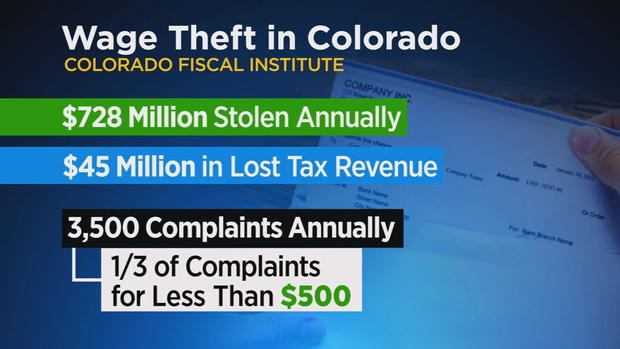"The pay wasn't right": Denver woman wins large wage case
A Denver jury has ruled a former caretaker at an area assisted living center was underpaid for a seven-year span.
Her attorney says the monetary award to the employee is likely to range between $325,000 to $762,000 - an amount he calls the largest individual wage theft case in the country.
"It needs to serve as a warning to employers to tell them there's real-world liability if they violate wage theft laws," said attorney David Miller, who represented Aleta Ayo, 34.
Wage theft is defined as non-payment of wages, underpayment, deduction violations and employee misclassification. The most likely victims are low-wage, immigrant and female workers.
Ayo began working as a caregiver for Meadow Vista Assisted living in 2015. She worked at a home the company operates in southeast Denver, which houses as many as eight people with mental illness.
"It came like second nature to me," said Ayo of the live-in job. She said she was on duty 24 hours a day for days on end without any relief.
Her starting pay was $3,000 per month. She said over the course of seven years working at the home, she complained to the owners about having no relief and working non-stop.
She said they made "empty promises" about getting her help, which she says never came. She said she had to enlist her mother to work so she could leave the home to run errands.
She said she kept working for the facility because she didn't want to "rock the boat" and said, "I was afraid because I thought they might fire me."
Ayo eventually said she realized she wasn't being paid correctly and in 2021, filed a lawsuit against the company.
In December, a jury ruled the company had failed to pay Ayo minimum wage for hours worked and failed to pay overtime. Miller says a judge will have the final say, but Meadow Vista has agreed that their liability will amount to at least $325,000.
A jury found that in 2016, Ayo worked 149 hours per week.
"The jury heard my story and the evidence and sided with what was right," said Ayo.
RELATED: Wage theft often goes unpunished despite state systems meant to combat it
"We need to cut down on employers stealing from employees," said Miller. "It's very simple."
The owner of Meadow Vista Assisted Living deferred questions to his attorney, who did not respond to multiple calls and emails from CBS News Colorado.
Ayo's court victory comes amid a renewed push to protect Colorado workers from wage theft, which costs Americans more than any other crime.
The Colorado Fiscal Institute estimated there was $728 million in wage theft in the state in 2022. The Institute estimated that nearly 440,000 low-wage Colorado workers experience wage theft every year.
According to the Economic Policy Institute, employers fail to pay American workers up to $50 billion each yeah. That's equal to 5.5 million stolen cars, nearly 12 million bank robberies or 76 million snatched purses.
"Wage theft remains a serious problem throughout the State of Colorado," said Boulder District Attorney Michael Dougherty.
"So they're working hard, doing their best then having money and benefits stolen by unscrupulous employers," said Dougherty.
He said wage theft is almost always raised in community meetings and is a "priority issue" for his office.
"People who engage in wage theft are denying those dreams to those who deserve it most," said the prosecutor.
Dougherty noted that several years ago, the state made wage theft a felony rather than a misdemeanor and potential wage theft victims can approach police, prosecutors, labor unions and non-profit organizations for help. He said his office is currently investigating several wage theft cases.
Each year, roughly 3,500 complaints are filed with Colorado's Division of Labor and Employment.
Scott Moss, CDLE's director of labor standards and statistics, says while some employers make honest mistakes and some commit inadvertent wage violations, "we typically have issued a thousand citations for violations a year."
He said about a third of those are cases where the disputed wages are $500 or less. Moss said it can take as little as three months to settle a wage theft case or up to six months.
Moss said two-thirds to three-fourths of employers who lose wage theft cases at the state level pay up, but if they don't, employees can take them to court to collect judgments.
Moss said about 15 to 18% of the cases CDLE rules on are later appealed.
Ayo, the assisted living facility worker, will likely learn soon from a judge precisely how much she will recoup in unpaid overtime and wages. She said she is considering using the proceeds to establish her own healthcare agency.
Additional Resources:
-If you want to file a wage complaint with the Colorado Department of Labor and Employment: https://socgov11-comm.force.com/LSCS/s/ or email: cdle_labor_standards@state.co.us
-Non-profits like Towards Justice will help workers who believe they are victims of wage theft: https://towardsjustice.org/
-Experts say you can also contact your local police or district attorney's office to initiate a wage theft complaint. Labor unions are also good resources for workers who believe they have been wage theft victims.






